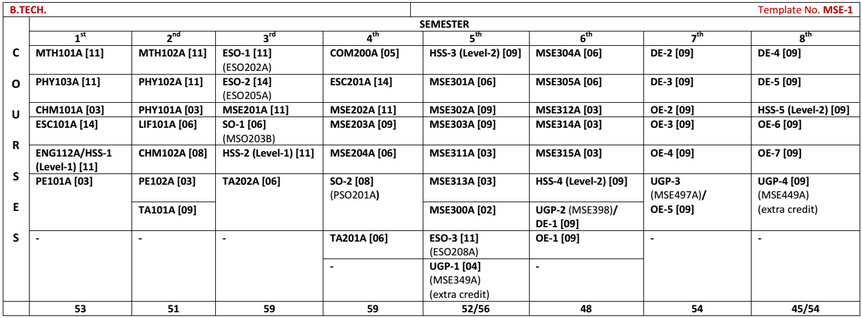IIT Kanpur made a move to a credit based system in 2011 for acquiring various degrees. In doing so, several important student centric changes were introduced. For example, all admissions to undergraduate degree programs at IIT Kanpur are now to a 4-year program, but subject to fulfillment of eligibility criterion, a student can enroll for a dual degree (B. Tech + M. Tech) by spending an additional year. The Master's degree could be in the same department as B. Tech or any other department of the institute. Or, a student can acquire a double major by spending another year by taking courses in another department as well. Another option available to the students is to acquire Minors, by taking a specific set of courses.
A B-Tech student in MSE studies with all students from various branches together for most of the courses in the first and second years of his/her program. Greater emphasis to the departmental training follows in the next two years. The departmental training program is described below.
B. Tech Program in MSE
From 2011, the department has changed its curriculum guided by following philosophy; it is a unique program offered only by IIT Kanpur.
1. Materials and Metallurgy training is a coherent and integrated activity, which cannot be broken in two separate parts. (Hence we have started calling ourselves the Department of Materials Science and Engineering which encompasses study of both, metallurgy and non-metals, their properties and science and engineering.
2. Every student of Materials Science and Engineering should acquire strong fundamentals in all types of materials, their properties and processing. We offer these through a short but comprehensive list of compulsory core courses.
Undergraduate Core Courses
|
ESO205A
|
Nature and Properties of Materials
|
|
MSE201A
|
Thermodynamics and Phase Equilibria
|
|
MSE202A
|
Rate Processes
|
|
MSE203A
|
Structure and Characterization of Materials
|
|
MSE204A
|
Introduction of Biomaterials
|
|
MSE301A
|
Phase Transformation
|
|
MSE302A
|
Mechanical Behavior of Materials
|
|
MSE303A
|
Electronic and Magnetic Proeprties of Materials
|
|
MSE311A
|
Physical Metallurgy Laboratory
|
|
MSE313A
|
Mechanical Behaviour Laboratory
|
|
MSE304A
|
Principles of Metal Extraction & Refining
|
|
MSE305A
|
Materials Processing
|
|
MSE312A
|
Functional Materials Laboratory
|
|
MSE314A
|
Process Engineering Laboratory
|
|
MSE315A
|
Manufacturing Processes Laboratory
|
3. With this background, strongly backed by science, now a student is expected to have a better knowledge of his/her technological leaning and areas of interest. To support the student's likely inclinations, the department offers a large number of courses in a variety of area. The department ensures that these courses are available to the student every year. They are offered in three buckets, namely
|
Sl.No.
|
Course Title
|
Offered in
|
|---|
|
1.
|
MSE604: Science and Technology of Thin Films and Device Fabrication
|
Even Semester
|
|
2.
|
MSE624: Energy Materials and Technologies
|
Even Semester
|
|
3.
|
MSE628: Electronic Devices and Characterization
|
Odd Semester
|
|
4.
|
MSE631: Electro-Ceramic Materials and Applications
|
Even Semester
|
|
5.
|
MSE693: Materials Science Technologies for Application in Life Sciences
|
Odd Semester
|
|
Sl.No.
|
Course Title
|
Offered in
|
|---|
|
1.
|
MSE421: Iron and Steel Making
|
Even Semester
|
|
2.
|
MSE422/MSE667: Selection and Design of Engineering Materials
|
Even Semester
|
|
3.
|
MSE659: Powder Metallurgy
|
Odd Semester
|
|
4.
|
MSE670: Solidification Processing
|
Odd Semester
|
|
5.
|
MSE671: Heat-Treatment and Surface Hardening
|
Odd Semester
|
|
Sl.No.
|
Course Title
|
Offered in
|
|---|
|
1.
|
MSE638: Symmetry and Properties of Crystals
|
Even Semester
|
|
2.
|
MSE639: Interfaces and Material Properties
|
'*'
|
|
3.
|
MSE642: Microscopy and Microanalysis of Materials
|
Odd Semester
|
|
4.
|
MSE658: Dislocations and Plasticity
|
Odd Semester
|
|
5.
|
MSE676: Material Failure- Analysis and Prevention
|
Even Semester |
|
6.
|
MSE694: Nanostructures and Nano-Materials-Characterization and Properties
|
Odd Semester
|
Hence, a student can choose to be the kind of Materials Engineer he/she wants to be, rather than the institute forcing a student by subjecting him/her to a long list of compulsory courses.
4. In addition, a student has additional electives available.
5. A student should also get hand's-on training. For this, B. Tech students are expected to participate in at least five laboratory courses.
In addition, slots of courses are available for research based projects (UGP-1 through UGP-4 from 5th semester to 8th semester)








